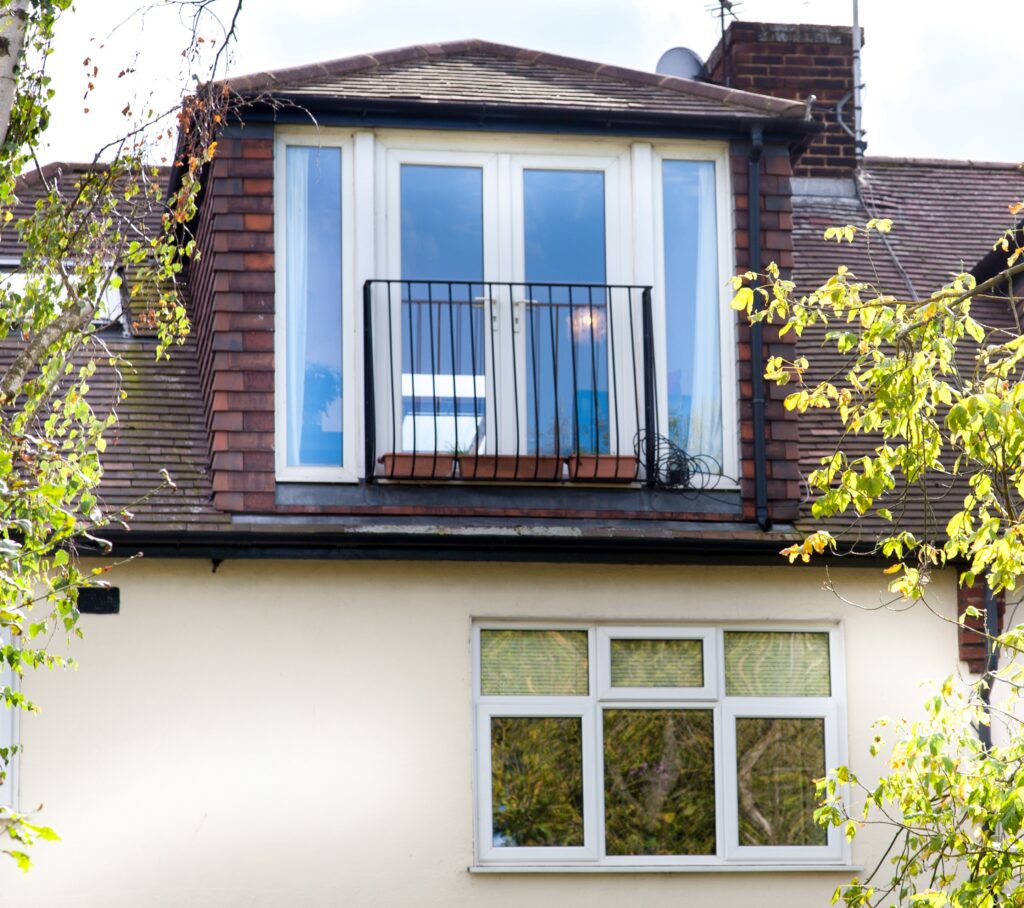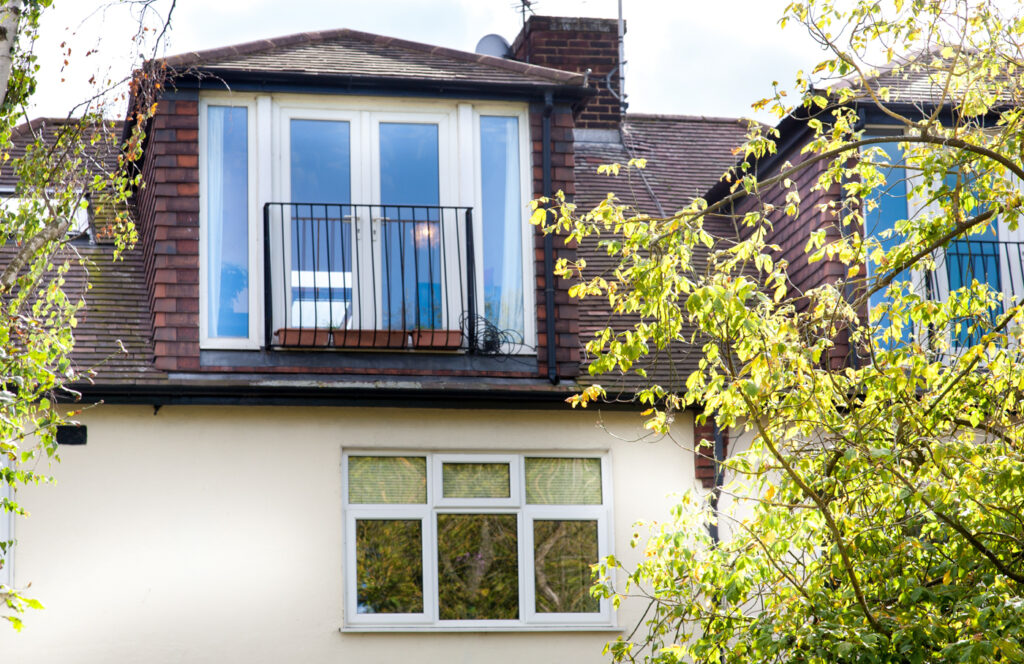Types of Loft Conversion
Pitched Dormer Loft Conversion
Dormer loft conversions help you to effortlessly transform your vacant loft space to an extremely versatile functional space. A pitched dormer, popularly known as cottage dormer, is considered the most apt alternative to gain extra space in old fashioned properties and cottages.
Elevate Your Home: The Appeal of a Pitched Dormer Loft Conversion
A Pitched Dormer Loft Conversion is the perfect way to unlock the potential of your attic while adding charm and character to your home’s exterior. By incorporating a dormer with a sloped, pitched roof, this type of conversion increases headroom and invites natural light into your loft space, making it feel open and inviting.
Whether you’re looking to create a cozy bedroom, a bright home office, or a playful children’s room, a pitched dormer brings both functionality and beauty to your home. Discover how this stylish and practical conversion can transform your attic into a stunning new living area that enhances both your space and property value.
All our conversion projects fully comply with the regulations set by the local building authority. From the initial design discussions through to construction and final completion, our skilled team provides comprehensive assistance with the Drawings, structural plans and schedule of works to ensure exceptional quality services.
We offer a 10-year guarantee on all Structural and roofing works, and are fully insured up to £10 million. Additionally, we provide the necessary guidance to obtain planning permission if necessary.
Marken Lofts are here to help with any issues that you may have. Try our new WhatsApp option using 07828 225 872. You can also fill out our enquiry form to get an instant quote.

What is a Pitched Dormer Loft Conversion?
A Pitched Dormer Loft Conversion, involves adding a dormer to the rear, side or both, with a pitched roof that extends from your existing roof slope.
The design features a triangular peak, or gable end blending seamlessly with the original roofline while creating additional headroom and floor space in your attic.
Pitched dormers are often used in traditional and period properties, but they can also be adapted to suit modern homes.
They can be preferable to in terms of aesthetics when compared to a Hip to Gable conversion.
Benefits of a Pitched Dormer Loft Conversion
Opting for a Pitched Dormer Loft Conversion comes with several benefits, making it a popular choice for many homeowners:
- Increased Headroom: The pitched dormer design creates more vertical space, making your loft more comfortable and functional for everyday use.
- Enhanced Curb Appeal: The attractive, pitched design complements your home’s existing architecture, enhancing the overall appearance and adding character to your property than a standard flat roof.
- Natural Light: Dormer and roof windows allow plenty of natural light to flow into your loft, making the space feel bright and welcoming.
- Versatile Design Options: Pitched dormers work well for various room types, including bedrooms, home offices, and playrooms, providing flexibility in how you use the new space.
- Improved Property Value: Adding an extra room or a more usable loft space can significantly boost your home’s market value, making a Pitched Dormer Loft Conversion a smart investment.
Ideas for Your Pitched Dormer Loft Conversion
A Pitched Dormer Loft Conversion can transform your attic into a practical and inviting space. Here are some inspiring ideas to make the most of the added room:
- Master Bedroom Suite: Create a luxurious master suite complete with a spacious bedroom, an en-suite bathroom, and a walk-in closet.
- Home Office: Set up a quiet, light-filled workspace where you can focus and be productive, with built-in shelving and ergonomic furniture.
- Children’s Bedroom: Make a playful, cozy bedroom for your kids, with space-saving storage and large dormer windows to keep the room bright.
- Guest Room: Design a welcoming guest bedroom with thoughtful touches like a comfortable bed, reading nook, and charming décor.
- Hobby Room or Studio: If you need a place to pursue your passions, consider using the loft as an art studio, music room, or crafting area.
Do I Need Planning Permission?
Whether or not you need planning permission for a Pitched Dormer Loft Conversion depends on several factors. Many pitched dormer conversions can be completed under permitted development rights, which means planning permission is not required if certain conditions are met:
- The dormer does not extend beyond the existing roof slope on the front elevation.
- The conversion does not exceed volume limits (typically 40 cubic meters for terraced houses and 50 cubic meters for detached and semi-detached houses).
- The roof height is not increased, and the dormer does not extend above the highest part of the existing roof.
- The materials used match the existing exterior of the home.
If your property is a listed building or located in a conservation area, you will likely need planning permission. It’s essential to consult with your local planning authority or a loft conversion expert to ensure compliance with local regulations.
Building Regulations
Even if planning permission isn’t necessary, your Pitched Dormer Loft Conversion must comply with building regulations to ensure safety and efficiency. Key areas covered by building regulations include:
- Structural Safety: The new dormer structure and any changes to the roof must be strong enough to support the added load.
- Fire Safety: Fire doors, smoke alarms, and a safe escape route are required to ensure the loft meets fire safety standards.
- Thermal Insulation: Adequate insulation is necessary to keep the loft energy-efficient and comfortable year-round.
- Staircase Requirements: A permanent staircase must be installed, and it needs to comply with building regulations for width, height, and headroom.
- Ventilation: Proper ventilation must be in place, especially if the loft includes a bathroom or kitchen area.
- Marken Lofts can typically arrange for inspections at different stages of the project to ensure the conversion meets all relevant building regulations.
What does a Pitched Dormer Loft Conversion Cost?
The cost of a Pitched Dormer Loft Conversion varies depending on the size of the dormer, the complexity of the project, and the materials used.
On average, a basic pitched dormer conversion starts from around £40,000 and can go up to £60,000 or more, depending on your specifications. Factors like custom finishes, additional features, or adding an en-suite bathroom will increase the overall cost.
While a Pitched Dormer Loft Conversion requires a substantial investment, the added value to your home and the improved quality of living make it worthwhile. The additional space and aesthetic appeal can make your property more desirable and boost its resale value in the future.
Conclusion
A Pitched Dormer Loft Conversion is a fantastic way to make the most of your attic space, combining practicality with aesthetic charm. Whether you dream of a serene master suite, a sunlit home office, or a cozy guest room, this type of loft conversion offers endless possibilities.
With increased headroom, natural light, and a design that enhances your home’s exterior, a pitched dormer is both a functional and visually appealing addition. By understanding planning permission, building regulations, and costs, you can ensure a smooth and successful conversion project that meets your needs and elevates your home.

Completed Projects
We created an entirely new living space for Diane in Chingford, transforming her loft with a Pitched Dormer Loft Conversion.
Why choose us to design and install your loft conversion?
With more than 28 years of practical experience, Marken Lofts specialise in delivering outstanding loft conversions. We take pride in our work and always strive to ensure our customers are truly happy and feel they have received exceptional value for their investment.
Our Commitment to Excellence
- Uncompromising Quality: Every project we undertake reflects our dedication to superior craftsmanship.
- Competitive Pricing: Offering exceptional value without compromising on excellence.
- Fully Insured: For your peace of mind, our team is fully insured up to £2 million.
- Immaculate Cleanliness: We maintain the highest standards of tidiness on every job.
- Transparent Pricing: Clear, upfront costs with no hidden surprises—know exactly what to expect.
- 10-Year Work Guarantee: Confidence and peace of mind with every project.
- End-to-End Project Management: From concept to completion, we handle every detail for a seamless loft conversion experience.
Our 10-Year Guarantee reflects the confidence we have in our skilled team to deliver outstanding results every time.
Areas we work in
We deliver exceptional loft conversions across North London, East London, and Central London. Get in touch if you would like to confirm we cover your area, or click on the map for more information.
For advice on a loft conversion or for a free survey call 0800 111 4883 or enquire online:
"*" indicates required fields
Types of Loft Conversions
Highly distinctive loft conversion services to enhance your space, whatever your needs.
How long will the consultation and survey take?
Generally, we allocate approximately 1-2 hours for the consultation and survey process, but its often is no longer than 40 minutes. For larger or more intricate projects, it may take slightly longer to ensure we capture all necessary information accurately. Rest assured, our goal is to provide a comprehensive evaluation while respecting your time constraints. If time is precious and you just want a price for the works, If you fill in our instant quote form, this will eradicate the need for an initial survey.
Do I need planning permission for a loft conversion?
Whether you’ll need planning permission or if your project falls under permitted development largely depends on various factors such as the type of property you own, its location, and the specific regulations set by your local planning authority. Typically, many loft conversions in London fall under permitted development rights, meaning you can carry out the conversion without the need for planning permission as long as certain criteria are met. However, it’s crucial to consult with a professional architect or a loft conversion specialist to assess your individual circumstances. Factors such as the size and shape of your loft, the proposed alterations, and any previous extensions or conversions already carried out on your property can affect whether your project qualifies for permitted development or requires planning permission.
How much does a loft conversion cost?
Loft conversion costs vary depending on factors such as the size and complexity of the project, the materials used. On average, a basic loft conversion can cost between £20,000 to £55,000, but this can increase significantly for larger or more complex projects.
How long does it take to complete a loft conversion?
The duration of a loft conversion depends on factors such as the size of the loft, the complexity of the design, and any unforeseen issues that may arise during construction. On average, we complete a loft conversion 6 weeks or less.
Will a loft conversion add value to my property?
Yes, a well-executed loft conversion can significantly increase the value of your London property. It not only provides additional living space but also enhances the overall appeal and functionality of your home, making it more attractive to potential buyers. What’s more, the enhanced value often exceeds the initial investment made in the loft conversion.
What type of loft conversion is best suited for my home?
The most suitable type of loft conversion for your London home depends on factors such as the existing roof structure, available space, and your specific requirements. Common types of loft conversions include dormer, Velux, hip-to-gable, L-Shape and mansard conversions. Contact us and we shall help determine the best option for your property.
Are there any building regulations or safety standards I need to adhere to when converting my loft in London?
Converting your loft requires strict adherence to building regulations and safety standards to guarantee structural integrity and compliance with fire safety regulations. It’s important to note that adding another storey to your home may necessitate upgrades to existing doors to meet fire safety requirements. As regulations are subject to change, partnering with a trusted company that emphasizes safety and compliance is paramount to ensure your project meets all necessary standards.
Do I need to inform my neighbors or obtain their consent before proceeding with a loft conversion?
Before commencing your loft conversion project, it’s important to consider whether any of your external walls are shared with a neighbor. In such cases, you’ll likely need to establish a party wall agreement. This legal agreement outlines the rights and responsibilities of both parties regarding construction work that impacts a shared wall or boundary. While this process can sometimes be straightforward, involving the signing of a party wall agreement form, your neighbor may opt to consult with a qualified party wall surveyor, which may incur additional costs on your part. It’s advisable to discuss this matter with your neighbor and seek professional advice to ensure a smooth process.

